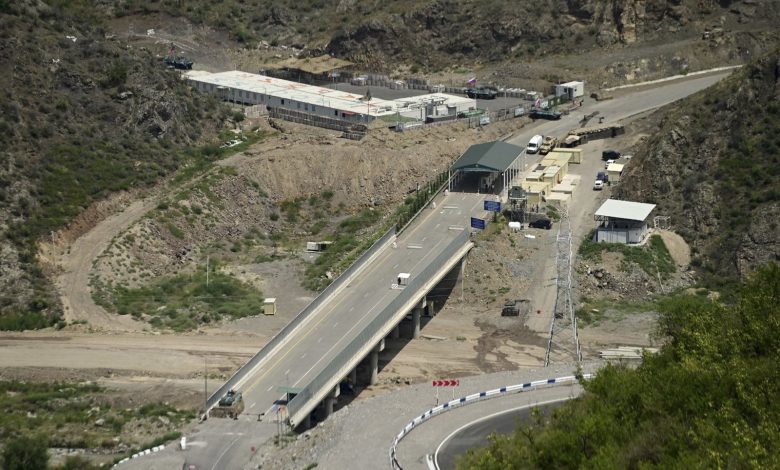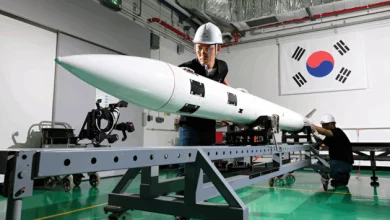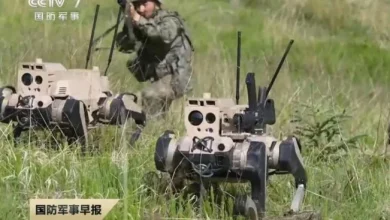Azerbaijanis hail return to land formerly occupied by Armenia

After 28 years of Armenian occupation, former residents of Azerbaijan’s Lachin welcome an emotional return home amid rebuilding following the heated conflict in 2020.
It has been three years since Azerbaijan liberated Lachin from Armenian occupation, but returnees are still trickling into the town. Azerbaijan hopes to speed up returns by restoring houses in Lachin. So far, some 1,000 people have resettled in 234 houses and about 970 families are expected to return by the end of 2024.
Work is still underway to improve infrastructure in the town from which Azerbaijanis were expelled in 1992 during the First Karabakh War. Located in a strategic location, the town surrounded by mountains is at a gateway that became a source of dispute between Azerbaijan and Armenia after the 2020 war. Azerbaijan accuses Armenia of provoking tensions in the Lachin Corridor linking Armenia to the formerly occupied town, which was settled by a small Armenian population after the occupation.
Ahmet Haydarov, 42, is among the returnees. He was 11 years old when his family was driven out of Lachin. “We were left homeless and went through hard times for 31 years though our state always supported us. Finally, our army saved our lands from invaders. We are happy to live in our hometown,” Haydarov told Ihlas News Agency (IHA) on Friday.
Haydarov said their children have been hesitant to return. “They did not know this place but we always talked about it at home for years. Now they tell us that it is more beautiful than we described,” he said.
Ekber Ismayılov, 67, recounts how he had to leave with his two young children back in 1992. “I have been here for 10 days. (Lachin) has a special place in our hearts. We are so happy to be back,” he said.
Ismayilov also said the reconstruction work in the town was “fast” and that all the former residents would return soon. “May God bless our commander in chief, our army,” he said, referring to President Ilham Aliyev.
For Nezaket Salmanova, it is “the beginning of a new life.” “I could not stop crying on the first day of my return,” 77-year-old Salmanova says. “It is a great joy to walk on these streets, seeing all the people we knew from the past. I am grateful to our martyrs who fought (to retake the town),” she said. Salmanova also spoke about Türkiye’s support to Azerbaijan and fondly remembered a poem about Lachin recited by President Recep Tayyip Erdoğan.
Salmanova laments how her husband passed away before seeing the liberation of Lachin. “He was sick. I remember how my children asked him if he needed anything and he replied he only wanted to drink water from the fountain that was in front of our house here.
“It has been tough times but we endured thanks to the aid of our state and the embrace of the people of Baku” where Salmanova and others lived before their return.
Lachin sits on a road that has served as the main link between Armenia and Nagorno-Karabakh. Azerbaijan has reclaimed control of the city and the “Lachin Corridor” after building an alternate route in line with a Russia-mediated truce that ended a 2020 war between Armenia and Azerbaijan. Russian peacekeepers and the Armenian population have left the areas along the route known as the Lachin Corridor, where Lachin, Zabuh and Sus are located. The area was temporarily put under Russian control in line with the tripartite declaration signed by Moscow, Baku and Yerevan on Nov. 10, 2020, following 44 days of the Second Karabakh War between Azerbaijan and Armenia. As part of the declaration, Azerbaijan built a 32-kilometer (20-mile) road passing around Lachin for the Armenian population in Karabakh to use on their way to and from Armenia. Russian peacekeepers providing security on the route of the old Lachin Corridor were required to move the checkpoints to the new road.
Lachin and its villages were occupied by the Armenian Army in 1992, and Armenians brought from Syria and Lebanon were settled there in the following years. Throughout the process, Azerbaijan has declared that it sees this as a war crime and a violation of the Geneva Conventions.
Azerbaijan and Armenia have been locked in a decades-old conflict over Nagorno-Karabakh, which is part of Azerbaijan but has been under the control of Armenian forces backed by Armenia since a separatist war there ended in 1994. During a six-week war in 2020 that killed more than 6,600 people, Azerbaijan reclaimed large parts of Nagorno-Karabakh and surrounding areas that had been controlled for decades by the Armenia-backed separatists. The cease-fire in 2020 was mediated by Russia, which deployed about 2,000 troops to the region to serve as peacekeepers.





